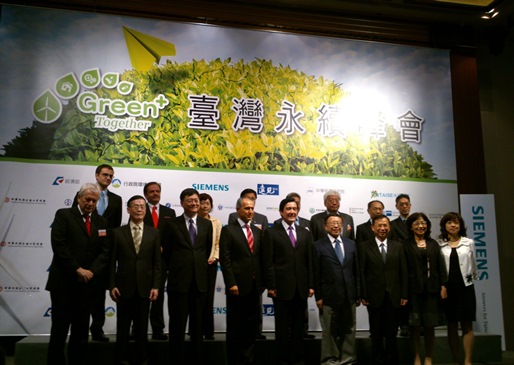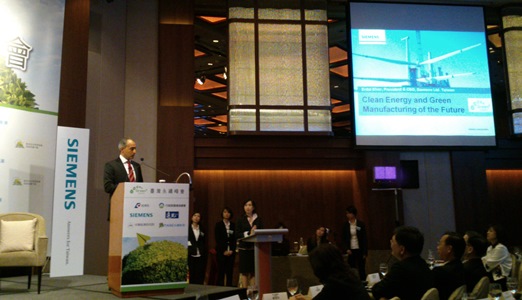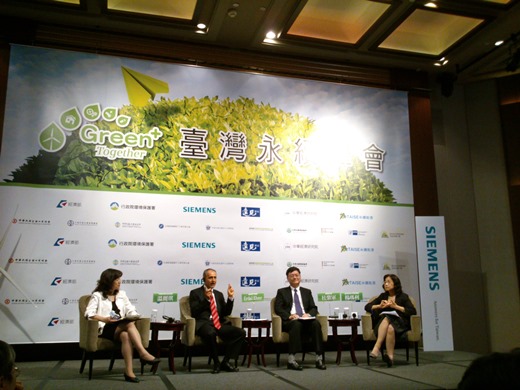Green + Together Taiwan Sustainability Summit Supported by ECCT LCI
The Summit was initiated and driven by Siemens. As an initiator, Siemens co-organized the Summit with Global Views Magazine, the Chung-Hua Institution for Economic Research (CIER) and the Taiwan Institute for Sustainable Energy (TAISE), with guidance from the Ministry of Economic Affairs (MoEA) and the Environmental Protection Administration (EPA). The ECCT's Low Carbon Initiative (LCI) was a supporting organizer along with the Chinese National Federation of Industries, the General Chamber of Commerce of the Republic of China, the Green Trade Office of the Executive Yuan, the Chinese National Association of Industry and Commerce, and the National Association of Small & Medium Enterprises, the German Institute and the German Trade Office among others.
Speeches were presented by President Ma Ying-jeou, Woody Duh (Tyzz-jiun), Vice Minister of Economic Affairs, Stephen Shen (Shu-hung), Minister of the Environmental Protection Administration and Erdal Elver, President & CEO of Siemens Taiwan and ECCT board director responsible for liaison with the LCI, Dr Wen from CIER and Dr Chien You-xin, representing the Taiwan Institute for Sustainable Energy. Many senior government officials and representatives from large multinational and Taiwanese enterprises were among the 150 guests who attended, including Dr. Chang Hwang-Jen, the Director-general of Environmental Protection Bureau, Tainan City Government, who was invited when the ECCT visited Tainan on 11 June.
Global View Magazine founder Gao Xi-jun and Erdal Elver gave opening remarks.
In his remarks Elver said that green and sustainable development is of utmost importance for Taiwan. He explained that sustainable growth needs a holistic approach that strikes a balance between economic growth, maintaining quality of life and safeguarding the environment for future generations. If business, government and the general public work together, he said that much can be achieved.
In his speech President Ma said that sustainable development, which the UN has defined as meeting the needs of the current generation without compromising the needs of future generations, has become a common goal globally. The president said that Taiwan has been working on sustainable development since the 1970s and this continues with the involvement of many initiatives and agencies. Two bills have been passed in recent years while another two are pending (The energy tax act still being drafted by the cabinet and Greenhouse Gas Reduction Act is still pending in the legislature).
The government has already overseen the installation of 314 wind turbines and plans to increase the number to 1,000 (including 600 offshore turbines). The president reiterated the government's pledge to ensure the safe use of nuclear energy in the near term and gradually phase out nuclear power in Taiwan.
Taiwan has substantially increased renewable energy capacity in recent years. However, renewables only account for 3.7% of Taiwan's energy generation. The government aims to raise this percentage to 9%. In addition, it is also promoting green factories and continued reduction in waste reduction. Taiwan has already cut household disposal by 50% thanks to extensive recycling programmes. As a consequence Taiwan is now burning much less waste than it used to.
First session
In his presentation, MoEA Vice Minister Duh gave an introduction to government policies related to sustainability. He noted that Taiwan needs to rethink how it uses natural resources. The whole production cycle needs to be taken into account including materials, water and energy usage. The ultimate goal should be to reduce waste or even reuse waste. This would not only increase competitiveness but also make industries more environmentally friendly. President Ma has targeted a 2% improvement in efficiency every year.
Besides the environmental impact, Taiwan needs renewable energy in order to ensure energy independence and therefore needs to invest in range of renewables.
In future, the government will make use of an energy tax.
According to Duh, reducing consumption of energy should be the first priority. Development of LED industry, wind turbines and solar are already generating business opportunities while biofuel and hydro power also offer potential green business opportunities in the future.
The government wants to install 450 wind turbines onshore but there are very few ideal locations and some of these have been subject to protests by local residents. For this reason, the government also wants to install 600 offshore wind turbines but first needs to iron out the technical difficulties. This requires examining the sea bed and planning for ocean currents and typhoons and other difficulties. In developing offshore wind, the government also has to consider shipping and defense issues (turbines block shipping lanes), the habitat for indigenous species such as dolphins and fishing rights issues. Offshore wind farms are also expensive. Nevertheless, Duh said the government will begin with a pilot project of six turbines.
The government plans to increase solar panel installations substantially from current capacity.
Duh also hinted at developing other renewable energy sources such as wave power generation and geothermal power although these are still in the experimental stage and will require much more trial and error before they can successful.
In her presentation, Dr Wen made the point that while market mechanisms work well in business, it is difficult for green energy to be successful using purely market mechanisms. Wen cited examples from other countries that helped to promote green solutions. Singapore created green city about 30 square kilometres to treat waste through a joint venture with China while Japanese companies invested in smart grids in the United States with the help of subsidies from the American government. This helped them to be standard setters overseas. Taiwan also lacks green finance, which is very important for industry development.
Erdal Elver gave a presentation on the subject of clean energy and green manufacturing of the future. He began by introducing several megatrends. Climate change is threatening humanity and has severe consequences such as recent devastating floods in Germany, which are unprecedented. But if renewables are promoted and enough efforts are devoted to energy saving technologies, there is hope for the future.
Globalisation is also a megatrend. Global trade has increased 27-fold from1950-2004. Increasing energy demand is putting more pressure on the environment.
A healthy energy mix is the key for a sustainable future of energy. This means that we need multiple sources, many of which are already available today.
Only 1.5% of Taiwan's energy comes from wind. Increasing this percentage will help to improve energy mix and create jobs. Green manufacturing is important because energy efficiency is a decisive cost factor. For example, electrical drives account for around 65% of industrial power consumption. Variable speed systems can reduce consumption by up to 70%.
Session 2
EPA Minister Shen talked about some of the government's plans and projects. The CEPD has a green energy plan, a green building plan and low carbon action plans among others.
The EPA has set up 10 task forces is working on 35 projects. Each government agency is expected to make a contribution. The EPA will then evaluate these projects to see if they meet their goals
According to Shen, Taiwan's carbon emissions have fallen over the past five years, partly helped by the drop in economic activity owing to the global financial and higher energy prices.
The government has helped to boost green business by changing traffic lights to LEDs and subsidizing the purchase of low energy appliances and various plans are in effect to save energy in government agencies. Shen is hopeful that all public buses will be replaced with electric buses within 10 years.
On the question of wind turbine protests, Shen said that residents don't get any benefits and to address this, one possible solution is to give residents part ownership of turbines.
The EPA has made 41 proposals on projects including electric buses, carbon capture and storage (CCS) for coal fired plants. He noted that some countries have achieved some success in this area and if it is effective it could be a solution for Taiwan because coal remains the cheapest source of fossil fuel.
Chien You-xin, representing the Taiwan Institute for Sustainable Energy said that Taiwan is one of the world's most inefficient energy users. Too much of GDP is spent on energy. According to Chien, Taiwan uses three to four times as much energy as Europe and twice as much as Japan proportionately. Chien disputed EPA Minister Shen's figures and said Taiwan's emissions fell only temporarily in the last few years on the back of the global financial crisis and are now rising again.
Chien said that all stakeholders need to work hard to combat climate change. People only think about the obvious but there is so much more that needs to be done beyond wind and solar power. Infrastructure needs to be upgraded but also market prices for energy are distorted. Taiwan also needs a very clear roadmap including five-year goals and milestones for stakeholders such as Taipower. Also, the government needs to offer financial support for sustainable initiatives.
Erdal Elver gave a second presentation on the subject "Low carbon cities for a sustainable future".
Continuing urbanization is one of the megatrends. Cities are the growth engines of economies but also carbon producers. Already more than half of the world's population is living in cities.
Cities need reliable infrastructure to keep living standards high and sustainable. Green buildings consume 30% less energy than regular buildings. Operational maintenance accounts for 80% of the energy in the life cycle of a building. Green buildings also make economic sense in terms of higher return on investment, higher occupancy and electricity bills that are 30-50% lower than average.
Buildings use energy but can also generate energy through solar panels. Electric cars can be used as mobile energy storage units. Energy also needs to be managed by smart grids to reduce inefficiencies. Elver concluded that achieving results will take joint action on the part of the government, business and the public.
Looking ahead, given the global trend towards steadily increasing urbanization, cities around the world will gradually come to play a key role for carbon reduction. If urban areas can achieve more efficient energy conservation with respect to buildings, transportation and smart power grids, then this will help to speed up the attainment of global carbon reduction goals. Siemens Ltd., Taiwan, a green solution provider and thought leader in sustainability, which embodies innovative green technology, is responding to this call not only through introducing its Green+ Grow Taiwan Together initiative, but through bringing together the power of the government, industry, and the public to promote economic development, environmental protection, and an enhanced quality of living.



